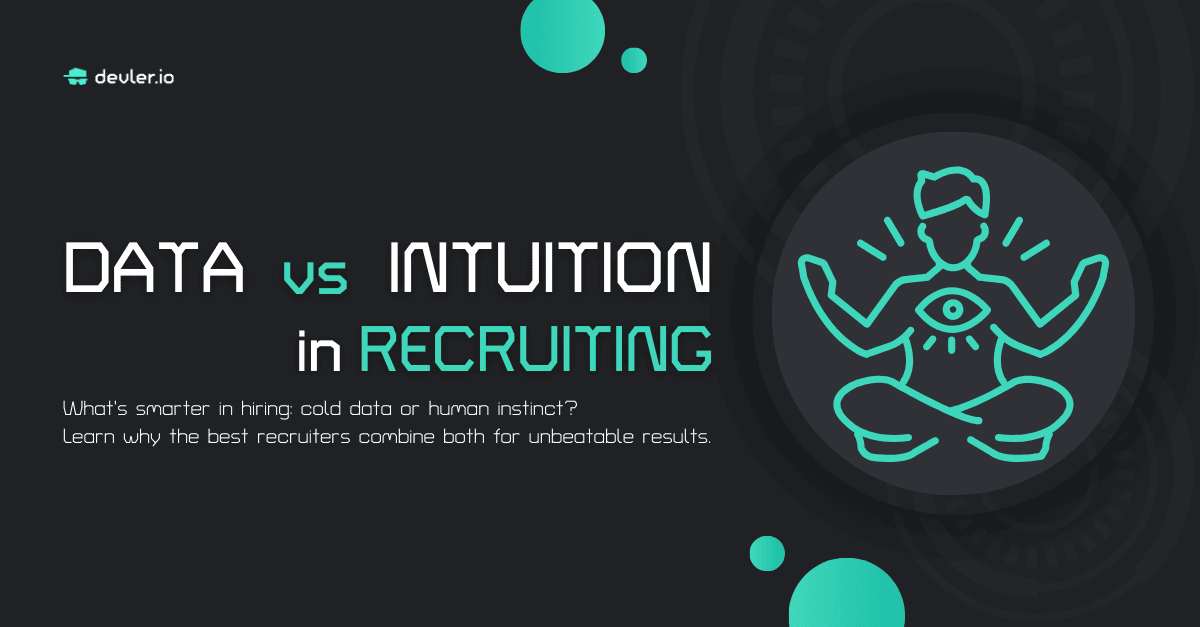Data or Intuition? Cracking the Hiring Code
Jan 09, 2025The recruitment process has seen a notable increase in complexity as a result of the competitive business environment seen in recent times. As posed by it, modern HR professionals must carefully think about how they hire and weigh intuition versus data-driven analytics to make effective hiring decisions.
Both methods do have their unique strengths and challenges and play a vital role in the success of recruitment. The key to effective hiring decisions lies in the balance, in finding the golden middle between these two approaches.
Read our article, and let’s discover how to combine intuition and data in hiring. Join us, as we unlock the secrets of how to build a stronger workforce for the future!
The Role of Intuition in HR
Intuition (or a so-called gut feeling) is a powerful tool for recruiters when making hiring decisions. But what is intuition when it comes to recruitment?
Intuition at its heart is the capability to make decisions based on experience, instinct, and subtle cues. This is especially effective for gauging “cultural fit,” an aspect of hiring where data might fall short. A candidate’s demeanor during an interview or how they relate to potential colleagues, for example, can be hard to quantify, but is usually obvious to an experienced recruiter.
When & why to use intuition in hiring?
Cultural fit assessment: Recruiters may feel that the candidate’s communication style or values align well with the company’s culture (which can result in a successful hire).
Unstructured interviews: In scenarios where open-ended questions are used, recruiters often rely on intuition to interpret responses and gauge sincerity or adaptability.
Detecting inconsistencies: A candidate might have a stellar resume, but their body language or tone of voice during the interview might suggest they're not being entirely truthful about their experience or skills. An interviewer might intuitively pick up on these inconsistencies.
Assessing genuine enthusiasm: While a candidate can verbally express interest in a role, a recruiter might sense whether that enthusiasm is genuine. This can be based on factors like eye contact, energy levels, and the way they talk about their past experiences.
As we can see, basically, intuition is a good thing in hiring. However, despite all the potential benefits, relying purely on your “feelings” is risky. Human biases can result in subjective and unfair decisions. For example, unconscious preferences for candidates with similar backgrounds or personalities to the recruiter may result in a lack of diversity in the workplace.
Data and Analytics in HR: What They Are and How to Use Them
Technology has transformed recruitment by offering data-driven solutions that could improve decision-making processes. HR analytics includes tools such as Applicant Tracking Systems (ATS), artificial intelligence (AI), and big data analysis. These tools are important for recruiters to assess candidates’ skills, forecast their performance, and cut down the hiring period. Let’s examine them in detail below.
ATS platforms
Approximately 98.4% of Fortune 500 companies utilize ATS platforms to streamline their hiring processes. What’s more, a significant 86% of HR professionals report that ATS usage accelerates talent acquisition.
ATS platforms can automatically review resumes to evaluate candidate’s alignment with job requirements, so only the most suitable profiles make it through the candidate doorway.
Predictive Analytics
Just like with the ATS platforms, the majority (89%) of HR leaders believe that predictive analytics is vital for the future of HR management. And, of course, this is not for nothing.
AI can take historical data and predict whether a candidate will be a good fit based on data such as their tenure at previous jobs, skills, and trends in the industry. This approach enhances employee retention and performance by selecting candidates who are more likely to thrive.
Big Data
Organizations utilizing big data analytics in HR have reduced recruitment costs by up to 20% and increased productivity by up to 25%.
Big data involves the analysis of massive volumes of structured and unstructured data to uncover patterns, trends, and insights. In HR, it enables recruiters to identify hiring trends, understand workforce dynamics, and predict future recruitment needs with unparalleled accuracy.
Now, let’s look at what are the benefits of the synergy of both intuition and data.
Not “Either-Or” but “Both”: Intuition and Data Should Work Together
The most effective recruitment tactics employ both intuition and data to capitalize on the best of both worlds. Here’s why this synergy delivers better results:
Improved Candidate Experience: While data-driven processes can streamline applications and initial screenings, relying solely on them can feel impersonal to candidates. Injecting human intuition, such as personalized follow-ups or genuine engagement during interviews, enhances the candidate experience. This can lead to a more positive impression of the company, even for those who aren't ultimately hired.
Better Decision Making: Data can give you objective insight, but intuition adds a layer of human judgment, ensuring that hires will fit culturally as well as technically.
Decreased Bias: The data-driven tool minimizes biases with the standard assessments while the intuition retains the uniqueness and flexibility of the process.
Incorporating both intuition and data creates a recruitment strategy that is not only efficient and objective but also human-centered. The combination of both ensures that organizations attract, evaluate, and retain talent in a way that aligns with both their immediate and long-term goals.
Summing up…
The debate between intuition and data in recruitment is not about choosing one over the other but finding the right balance. By integrating these approaches, HR professionals can make more informed, fair, and effective hiring decisions. Success lies in leveraging data for its precision and intuition for its human touch.
If you are looking for IT experts, look no further. Find and hire tech talent with ease on Devler.io, as we combine both intuition and data approach to find the best candidates!
